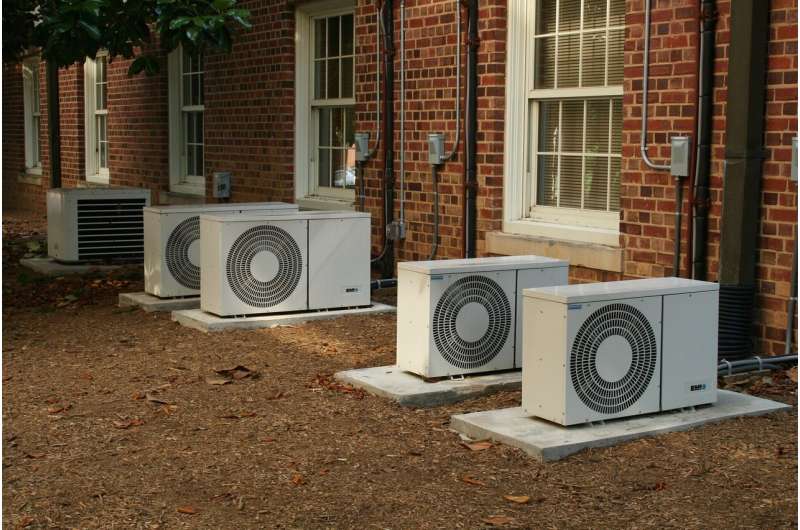May 3, 2019 weblog
Researchers propose air conditioners as climate-change remedy

Scientists have an idea that could make you feel more like a green citizen than hedonist if you buy an air conditioner for your living quarters. There is a way that could use the units to fight climate change. OK, let us review the question posed by a Fast Company: What if every air conditioner was stopping climate change as it kept you cool?"
What if you could flip the process, where instead of putting in carbon from the air, carbon would be removed from the air?' Adele Peters explained why this matters: air conditioning "may use so much electricity by the middle of the century that it could push up the average global temperature by half a degree."
Here is a bit of irony that did not escape The Download writer Charlotte Jee: "Air-conditioning units are energy intensive, causing emissions that contribute to rising global temperatures (which then, ironically, cause more people to buy AC units)."
Air-conditioning units would be revisited as machines that capture carbon dioxide and transform it into fuel.
Scientific American had an especially clear summary of what the team was talking about.
"Heating, ventilation and air conditioning (or HVAC) systems move a lot of air. They can replace the entire air volume in an office building five or 10 times an hour. Machines that capture carbon dioxide from the atmosphere—a developing fix for climate change—also depend on moving large volumes of air. So why not save energy by tacking the carbon capture machine onto the air conditioner?"
Peters: "Modular attachments to air conditioners could pull air inside and through filters that capture CO2."
The researchers said, "It would be not that difficult technically to add a CO2 capture functionality to an A/C system, and an integrated A/C-DAC unit is expected to show favourable economics."
Once collected, water and CO2, said Jee, would be converted into renewable hydrocarbon fuels.
Richard Conniff in Scientific American referred to co-author Geoffrey Ozin claiming that much of the necessary technology was already commercially available. "Carbon capture equipment could come from a Swiss 'direct air capture' company called Climeworks, and the electrolyzers to convert carbon dioxide and water into hydrogen are available from Siemens, Hydrogenics or other companies."
Peters noted the researchers' numbers, who calculated (1) one large office tower in Frankfurt, Germany, could capture enough CO2 to produce more than 600,000 gallons of fuel in a year and (2) office buildings throughout the city could produce more than 120 million gallons. "The same process could happen on buildings everywhere."
The researchers' paper carries a fetching title, "Crowd oil not crude oil," by Roland Dittmeyer, Michael Klumpp, Paul Kant and Geoffrey Ozin, Nature Communications.
In the abstract, the authors said they proposed "retrofitting air conditioning units as integrated, scalable, and renewable-powered devices capable of decentralized CO2 conversion and energy democratization."
As for the paper's title, in what way does the crowd element fit into their proposal?
A figure caption in their paper addressed this. "Renewable oil wells, a distributed social technology, whereby people in homes, offices and commercial buildings all around the world, collectively harvest renewable electricity and heat and use air conditioning and ventilation systems to capture CO2 and H2O from ambient air and convert it, by chemical processes, into renewable synthetic oil—crowd oil—substituting for non-renewable fossil-based oil—a step towards a circular CO2 economy."
The researchers have an envisioned model of crowd oil from solar refineries, akin to crowd electricity from solar panels. This would enable "people to take control and collectively manage global warming and climate change, rather than depending on the fossil power industrial behemoth."
Tech watchers' reactions to the plan?
"Highly speculative." "Purely theoretical." Charlotte Jee's remarks were on the ground, not the bandwagon. She said, "while it's an attractive idea [crowd oil concept], there are lots of challenges to be addressed before it could ever become a reality. It could also potentially distract from the crucial mission of reducing the level of emissions we produce in the first place."
Eric Worrall in watts up with that? was not rating this concept as bright idea of the year. "Turning every high-rise residential or office building air conditioner into a miniature flammable petroleum refinery which vents electrolysis oxygen. What could possibly go wrong?"
The authors appeared to acknowledge the paper encompassed discussions of CO2 reduction, while future fuller analysis would be needed.
"The preliminary analysis presented above demonstrates the potential of capturing CO2 from air conditioning systems in buildings, for making a substantial amount of liquid hydrocarbon fuels. While the analysis considers the CO2 reduction potential, carbon efficiency and overall energy efficiency, it does not touch on spatial, or economic metrics for the requisite systems. These have to be obtained from a full techno-economic and life cycle analysis of the entire system."
More information: Roland Dittmeyer et al. Crowd oil not crude oil, Nature Communications (2019). DOI: 10.1038/s41467-019-09685-x
© 2019 Science X Network



















